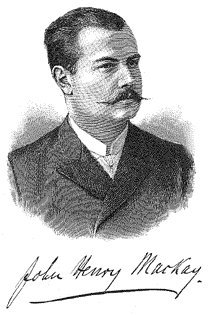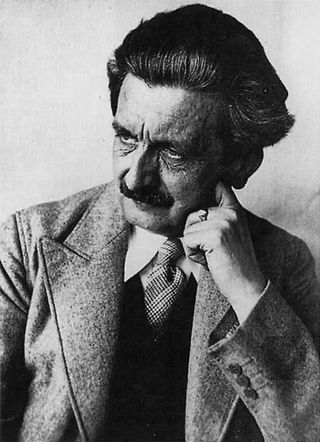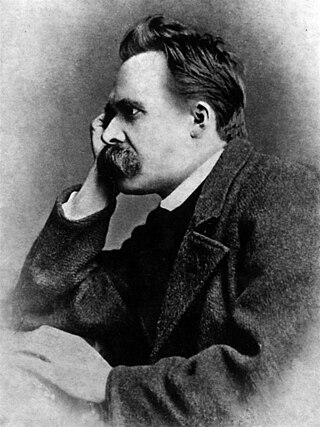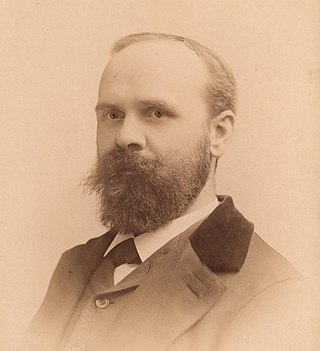Related Research Articles
Egoism is a philosophy concerned with the role of the self, or ego, as the motivation and goal of one's own action. Different theories of egoism encompass a range of disparate ideas and can generally be categorized into descriptive or normative forms. That is, they may be interested in either describing that people do act in self-interest or prescribing that they should. Other definitions of egoism may instead emphasise action according to one's will rather than one's self-interest, and furthermore posit that this is a truer sense of egoism.
Individualist anarchism is the branch of anarchism that emphasizes the individual and their will over external determinants such as groups, society, traditions, and ideological systems. Although usually contrasted with social anarchism, both individualist and social anarchism have influenced each other. Mutualism, an economic theory sometimes considered a synthesis of communism, market economy and property, has been considered individualist anarchism and other times part of social anarchism. Many anarcho-communists regard themselves as radical individualists, seeing anarcho-communism as the best social system for the realization of individual freedom. Some anarcho-capitalists claim anarcho-capitalism is part of the individualist anarchist tradition, while others disagree and claim individualist anarchism is only part of the socialist movement and part of the libertarian socialist tradition. Economically, while European individualist anarchists are pluralists who advocate anarchism without adjectives and synthesis anarchism, ranging from anarcho-communist to mutualist economic types, most American individualist anarchists of the 19th century advocated mutualism, a libertarian socialist form of market socialism, or a free-market socialist form of classical economics. Individualist anarchists are opposed to property that violates the entitlement theory of justice, that is, gives privilege due to unjust acquisition or exchange, and thus is exploitative, seeking to "destroy the tyranny of capital,—that is, of property" by mutual credit.
Individualism is the moral stance, political philosophy, ideology and social outlook that emphasizes the intrinsic worth of the individual. Individualists promote realizing one's goals and desires, valuing independence and self-reliance, and advocating that the interests of the individual should gain precedence over the state or a social group, while opposing external interference upon one's own interests by society or institutions such as the government. Individualism makes the individual its focus, and so starts "with the fundamental premise that the human individual is of primary importance in the struggle for liberation".

Johann Kaspar Schmidt, known professionally as Max Stirner, was a German post-Hegelian philosopher, dealing mainly with the Hegelian notion of social alienation and self-consciousness. Stirner is often seen as one of the forerunners of nihilism, existentialism, psychoanalytic theory, postmodernism and individualist anarchism.

The Ego and Its Own, also known as The Unique and Its Property is an 1844 work by German philosopher Max Stirner. It presents a post-Hegelian critique of Christianity and traditional morality on one hand; and on the other, humanism, utilitarianism, liberalism, and much of the then-burgeoning socialist movement, advocating instead an amoral egoism. It is considered a major influence on the development of anarchism, existentialism, nihilism, and postmodernism.

John Henry Mackay was a Scottish-German egoist anarchist, thinker and writer. Born in Scotland and raised in Germany, Mackay was the author of Die Anarchisten and Der Freiheitsucher.

Gustav Adolf Franz Brand was a German writer, egoist anarchist, and pioneering campaigner for the acceptance of male bisexuality and homosexuality.
Individualist anarchism in the United States was strongly influenced by Benjamin Tucker, Josiah Warren, Ralph Waldo Emerson, Lysander Spooner, Pierre-Joseph Proudhon, Max Stirner, Herbert Spencer and Henry David Thoreau. Other important individualist anarchists in the United States were Stephen Pearl Andrews, William Batchelder Greene, Ezra Heywood, M. E. Lazarus, John Beverley Robinson, James L. Walker, Joseph Labadie, Steven Byington and Laurance Labadie.

Julius Faucher was a German journalist and a significant advocate of liberalism and free trade. He was one of the first to advocate privatizing the security functions of the state, which would eliminate taxation. Ralph Raico described his idea as "a form of individualist anarchism, or, as it would be called today, anarcho-capitalism or market anarchism".
Sidney Parker, also known as S. E. Parker, was an English egoist and a former individualist anarchist who wrote articles and edited several journals from 1963–1993. Notably Parker wrote the introductions to the books Might is Right and The Ego and Its Own by Max Stirner.
Philosophical anarchism is an anarchist school of thought which focuses on intellectual criticism of authority, especially political power, and the legitimacy of governments. The American anarchist and socialist Benjamin Tucker coined the term philosophical anarchism to distinguish peaceful evolutionary anarchism from revolutionary variants. Although philosophical anarchism does not necessarily imply any action or desire for the elimination of authority, philosophical anarchists do not believe that they have an obligation or duty to obey any authority or conversely that the state or any individual has a right to command. Philosophical anarchism is a component especially of individualist anarchism.

The ideas of the 19th century German philosophers Max Stirner and Friedrich Nietzsche have been compared frequently. Many authors have discussed apparent similarities in their writings, sometimes raising the question of influences. In Germany, during the early years of Nietzsche's emergence as a well-known figure, the only thinker who discussed his ideas more often than Stirner was Arthur Schopenhauer. It is certain that Nietzsche read about Stirner's book The Ego and Its Own, which was mentioned in Friedrich Albert Lange's History of Materialism and Critique of its Present Importance (1866) and Eduard von Hartmann's Philosophy of the Unconscious (1869), both of which young Nietzsche knew well. However, there is no irrefutable indication that he actually read it as no mention of Stirner is known to exist anywhere in Nietzsche's publications, papers or correspondence.
Egoist anarchism or anarcho-egoism, often shortened as simply egoism, is a school of anarchist thought that originated in the philosophy of Max Stirner, a 19th-century philosopher whose "name appears with familiar regularity in historically orientated surveys of anarchist thought as one of the earliest and best known exponents of individualist anarchism". Egoist anarchism places the individual at the forefront, crafting ethical standards and actions based on this premise. It advocates personal liberation and rejects subordination, emphasizing the absolute priority of self-interest.

Die Anarchisten: Kulturgemälde aus dem Ende des XIX Jahrhunderts is a book by anarchist writer John Henry Mackay published in German and English in 1891. It is the best known and most widely read of Mackay's works, and made him famous overnight. Mackay made it clear in the book's subtitle that it was not intended as a novel, and complained when it was criticised as such, declaring it instead propaganda. A Yiddish translation by Abraham Frumkin was published in London in 1908 by the Worker's Friend Group, with an introduction by the journal's editor, prominent London anarchist Rudolf Rocker. It was also translated into Czech, Dutch, French, Italian, Russian, Spanish, and Swedish. Die Anarchisten had sold 6,500 copies in Germany by 1903, 8,000 by 1911, and over 15,000 by the time of the author's death in 1933.
Individualist anarchism in Europe proceeded from the roots laid by William Godwin and soon expanded and diversified through Europe, incorporating influences from individualist anarchism in the United States. Individualist anarchism is a tradition of thought within the anarchist movement that emphasize the individual and his or her will over external determinants such as groups, society, traditions, and ideological systems. While most American individualist anarchists advocate mutualism, a libertarian socialist form of market socialism, or a free-market socialist form of classical economics, European individualist anarchists are pluralists who advocate anarchism without adjectives and synthesis anarchism, ranging from anarcho-communist to mutualist economic types.
The relation between anarchism and Friedrich Nietzsche has been ambiguous. Even though Nietzsche criticized anarchists, his thought proved influential for many of them. As such "[t]here were many things that drew anarchists to Nietzsche: his hatred of the state; his disgust for the mindless social behavior of 'herds'; his anti-Christianity; his distrust of the effect of both the market and the State on cultural production; his desire for an 'übermensch'—that is, for a new human who was to be neither master nor slave".
Major anarchist thinkers, past and present, have generally supported women's equality. Free love advocates sometimes traced their roots back to Josiah Warren and to experimental communities, viewing sexual freedom as an expression of an individual's self-ownership. Free love particularly stressed women's rights. In New York's Greenwich Village, "bohemian" feminists and socialists advocated self-realisation and pleasure for both men and women. In Europe and North America, the free love movement combined ideas revived from utopian socialism with anarchism and feminism to attack the "hypocritical" sexual morality of the Victorian era.
German individualist philosopher Max Stirner became an important early influence in anarchism. Afterwards Johann Most became an important anarchist propagandist in both Germany and in the United States. In the late 19th century and early 20th century there appeared individualist anarchists influenced by Stirner such as John Henry Mackay, Adolf Brand and Anselm Ruest and Mynona.

Benjamin Ricketson Tucker was an American individualist anarchist and self-identified socialist. Tucker was the editor and publisher of the American individualist anarchist periodical Liberty (1881–1908). Tucker described his form of anarchism as "consistent Manchesterism" and stated that "the Anarchists are simply unterrified Jeffersonian Democrats."

The Young Hegelians, or Left Hegelians (Linkshegelianer), or the Hegelian Left, were a group of German intellectuals who, in the decade or so after the death of Georg Wilhelm Friedrich Hegel in 1831, reacted to and wrote about his ambiguous legacy. The Young Hegelians drew on his idea that the purpose and promise of history was the total negation of everything conducive to restricting freedom and reason; and they proceeded to mount radical critiques, first of religion and then of the Prussian political system. They rejected anti-utopian aspects of his thought that "Old Hegelians" have interpreted to mean that the world has already essentially reached perfection.
References
- 1 2 3 Mackay, John Henry (2005). Max Stirner : his life and his work. Peremptory Publications. OCLC 268661593.
- 1 2 3 Carus, Paul (1911). "Max Stirner, the Predecessor of Nietzsche". Monist. 21 (3): 376–397. doi:10.5840/monist19112137. ISSN 0026-9662.
- 1 2 David, Sprengel (1902-11-20). "En individualist från 1840-talet". Svenska Dagbladet (in Swedish). p. 5. Retrieved 2022-02-05.
- ↑ Max Stirner (Stanford Encyclopedia of Philosophy)